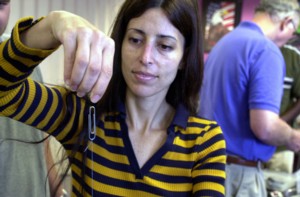
Valerie Bicouvaris, Berkeley Middle School, Williamsburg, uses magnetism to conduct a "magic" trick during the course section on magnetism.
As part of Jefferson Lab's commitment to contributing to science education across the region, the Lab held its fourth annual P.E.S.T. (Physics Enrichment for Science Teachers) program, July 7 – 31.
The program, held at this Department of Energy research laboratory, is designed to further the knowledge of middle-school science teachers by providing them with a mini-course in basic physics: material and information that they might not have seen in years, or, depending upon their studies in college, may never have received at all.
Two local teachers taught the course: Instructors Joe Garrity, an Advanced Placement Physics teacher at Poquoson High School, Poquoson, Va., and Neal Jenkins, a retired Senior Naval Officer, who teaches AP Physics and AP Calculus at Norview High School, Norfolk, Va.
Both teachers have watched the program evolve over the years to meet the changing needs of the middle-school curriculum. Garrity explained, "The program is constantly evolving to accommodate the changing needs among teachers. We try to find the happy medium between lessons and hands-on activities that will increase knowledge. It's a balancing act. We greatly appreciate the feedback given to us before, during, and after the class is taught."

Jonathan Franklin, Portsmouth Catholic Elementary School, Portsmouth, studies magnetism.
This year's four-week program drew 21 people, mostly teachers from the Peninsula and Tidewater but including participants from as far away as Minnesota, Kentucky and New Jersey. Many of the teachers had not taken physics classes taken in college. Therefore, the program has been extremely beneficial as it provides a solid knowledge foundation for those teachers as well as ideas for teaching the material in the classroom.
"Teachers teaching teachers is an important aspect of this program," explains Stacy Ring, Jefferson Lab Science Education technician and P.E.S.T. coordinator. "Our two instructors have a fantastic understanding of physics and what works when teaching it in the classroom. They understand classroom dynamics and interacting with students so they can really relate with the P.E.S.T. participants. Occasionally they'll even break away from the lesson plan to discuss personal teaching experiences and creative ways to present concepts in the classroom.
The group met mornings, Monday through Thursday. Each day included two classroom sessions followed by a mini-lecture given by a JLab subject-area expert — in lasers, experimental physics, engineering, medical imaging and electrostatics — giving the P.E.S.T. participants a better understanding of current applications for physics. During the last week, participants took time to share with each other the physics lessons they created as assignments during the program.
P.E.S.T. participants receive a stipend and earn 65 participation hours toward their teacher re-licensure or re-certification. The University of Virginia recently accredited the program, allowing attendees to earn three graduate credit hours that may be applied toward a master's degree through UVa.
JLab to the rescue!
 Tiffany Lockett |
Meet Tiffany Lockett, a teacher at Jefferson Davis Middle School in Hampton, Va. Like many middle school instructors, Lockett found herself teaching a subject that she wasn't fully prepared for. In this case, physics. Some blame it on cuts in education funding, others on the lack of teachers nationwide. Regardless, one thing is certain: if teachers aren't taught correctly, their students won't be either!
Lockett majored in biology in college. As such, she has a strong background in chemistry and even astronomy. However, she teaches physical science; a subject that includes dabbling into areas of physics. Not having had physics in college, she found teaching it to be extra challenging. She realized that she needed to strengthen her knowledge foundation.
Jefferson Lab's P.E.S.T. (Physics Enrichment for Science Teachers) program made this possible. She was delighted to participate in the program and said it was very worthwhile. Upon arrival, she discovered an additional benefit: finding out about the on-line classes she could take through the University of Virginia (UVa accredits the P.E.S.T. program) that are needed to fulfill her teaching licensure requirements.
"Before this, I didn't know what I was going to do," Lockett said. "All the classes that I needed were only offered during the daytime." One can see the scheduling conflict that this imposes on teachers.
John Anderson, II, JLab Public Affairs intern

